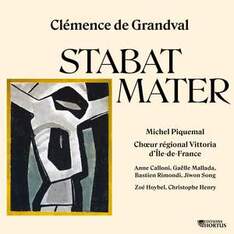Die Zeitung Le Ménestrel berichtete im Jahre 1870 vom Stabat Mater der Komponistin Clémence de Grandval: « Mit diesem meisterhaften Werk hat Frau de Grandval einmal mehr bewiesen, dass sie eine wahre Komponistin unter den Besten ist ».
Clémence de Grandval wurde 1828 geboren. Sie studierte bei Friedrich von Flotow, Camille Saint-Saëns und Frédéric Chopin. Sie komponierte symphonische Werke, Kammermusik, Lieder, Opern und geistliche Musik, darunter ihr erfolgreiches Stabat Mater. Sie starb im Jahre 1907.
Das ursprünglich für Chor und Orchester komponierte Werk, das mit einem düsteren instrumentalen Präludium beginnt und mit einem kraftvollen Inflammatus endet, ist auf diesem Album mit Klavier- und Harmoniumbegleitung zu hören.
Das Werk ist dramatisch, wenn nicht sogar opernhaft und durchgehend packend. Nur hinterlässt mich die vorliegende Aufführung eher hungrig. Ich würde sehr gerne das Stück im Original und mit guten Solisten, einem guten Chor und in einer guten Aufnahme hören. All das ist hier leider nicht gegeben.
Die Aufnahme ist akzeptabel, wenn nicht gesungen wird, aber ansonsten klingt sie wenig konturiert sowie wenig präzise und klar. Das Vokalquartett ist unausgewogen, und wenn die Sopranistin Anne Calloni auch noch gut ist, so sind die drei anderen Sänger ihren Aufgaben nicht gewachsen. Der Chor singt engagiert, aber der verschwommene Klang ist alles andere als förderlich und erlaubt keine weitere Bewertung. Wir warten also auf eine zweite Einspielung dieses Werks, um uns an der Musik wirklich erfreuen zu können.
In 1870, the newspaper Le Ménestrel reported on the Stabat Mater by the composer Clémence de Grandval: « With this masterful work, Mrs. de Grandval has once again proven that she is a true composer among the best ».
Clémence de Grandval was born in 1828. She studied with Friedrich von Flotow, Camille Saint-Saëns and Frédéric Chopin. She composed symphonic works, chamber music, songs, operas and sacred music, including her successful Stabat Mater. She died in 1907.
Originally composed for choir and orchestra, the work, which begins with a sombre instrumental prelude and ends with a powerful Inflammatus, can be heard on this album with piano and harmonium accompaniment.
The work is dramatic, if not operatic, and gripping throughout. But this performance leaves me rather hungry. I would very much like to hear the piece in the original, with good soloists, a good choir and in a good recording. Unfortunately, none of this is available here.
The recording is acceptable when there is no singing, but otherwise it sounds lacking in contour, precision and clarity. The vocal quartet is unbalanced, and even if the soprano Anne Calloni is good, the other three singers are not up to the task. The choir sings with commitment, but the blurred sound is anything but conducive and does not allow any further evaluation. We are therefore waiting for a second recording of this work to be able to really enjoy the music.




















